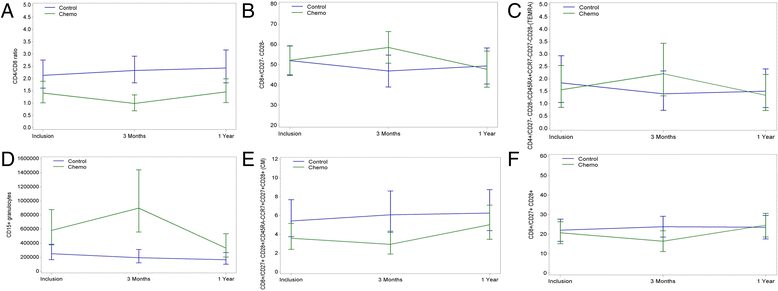Immune profiles of elderly breast cancer patients are altered by chemotherapy and relate to clinical frailty
- PMID: 28241844
- PMCID: PMC5330012
- DOI: 10.1186/s13058-017-0813-x
Immune profiles of elderly breast cancer patients are altered by chemotherapy and relate to clinical frailty
Abstract
Background: Effective therapeutic management of elderly patients with cancer, on an individual basis, remains a clinical challenge. Here, we identify novel biomarkers to assess elderly patients (≥70 years of age) with breast cancer undergoing treatment with or without chemotherapy.
Methods: We performed comprehensive geriatric assessment and measured markers sensitive to alteration in ageing, including leukocyte telomere length, CMV serostatus, levels of circulating growth factors and cytokines, and immune profiling of T cell and myeloid populations in blood before and at 3 months and 12 months after initiation of therapy, using flow cytometry.
Results: We observed changes in immune profiles over time that were specific to patients receiving chemotherapy; these patients had elevated CD4+ T effector memory re-expressing CD45RA (TEMRA) cells and relatively lower CD8+ central memory cells at 3 months, with normalized levels after 12 months. Patients' baseline immune profiles correlated with markers such as telomere length, cytomegalovirus (CMV) serostatus and levels of circulating cytokines. We also identified correlations between baseline immune profile and geriatric assessment, i.e. more frail patients had higher levels of granulocytic cells but lower levels of cells with suppressor phenotypes including myeloid-derived suppressor cells and regulatory T cells, although none of the examined immune populations correlated with chronological age. Importantly, immune profiles prior to therapy predicted unexpected hospitalizations in patients receiving chemotherapy.
Conclusion: These findings suggest that immune profiling may represent a novel complementary approach to more accurately assess the global health status of the elderly patient with breast cancer and select the most appropriate individual treatment option.
Trial registration: ClinicalTrials.gov, NCT00849758 . Registered on 20 February 2009.
Keywords: Blood leukocyte; Breast cancer; Chemotherapy; Clinical frailty; Immune profile.
Figures

Similar articles
-
Immune senescence and cancer in elderly patients: results from an exploratory study.Exp Gerontol. 2013 Dec;48(12):1436-42. doi: 10.1016/j.exger.2013.09.011. Epub 2013 Oct 10. Exp Gerontol. 2013. PMID: 24120567
-
Latency for cytomegalovirus impacts T cell ageing significantly in elderly end-stage renal disease patients.Clin Exp Immunol. 2016 Nov;186(2):239-248. doi: 10.1111/cei.12846. Epub 2016 Aug 19. Clin Exp Immunol. 2016. PMID: 27460884 Free PMC article.
-
Age-related microRNAs in older breast cancer patients: biomarker potential and evolution during adjuvant chemotherapy.BMC Cancer. 2018 Oct 22;18(1):1014. doi: 10.1186/s12885-018-4920-6. BMC Cancer. 2018. PMID: 30348127 Free PMC article.
-
Adjuvant chemotherapy in elderly patients with early breast cancer. Impact of age and comprehensive geriatric assessment on tumor board proposals.Crit Rev Oncol Hematol. 2011 Aug;79(2):196-204. doi: 10.1016/j.critrevonc.2010.06.005. Epub 2010 Jul 23. Crit Rev Oncol Hematol. 2011. PMID: 20655243 Review.
-
Immunosenescence Study of T Cells: A Systematic Review.Front Immunol. 2021 Jan 15;11:604591. doi: 10.3389/fimmu.2020.604591. eCollection 2020. Front Immunol. 2021. PMID: 33519813 Free PMC article.
Cited by
-
Male Breast Cancer: A Comparative Analysis from the National Cancer Database.World J Mens Health. 2021 Jul;39(3):506-515. doi: 10.5534/wjmh.200164. Epub 2020 Dec 4. World J Mens Health. 2021. PMID: 33474851 Free PMC article.
-
The role of radiation therapy and systemic therapies in elderly with breast cancer.Transl Cancer Res. 2020 Jan;9(Suppl 1):S97-S109. doi: 10.21037/tcr.2019.07.04. Transl Cancer Res. 2020. PMID: 35117951 Free PMC article. Review.
-
Polyfunctional KLRG-1+CD57+ Senescent CD4+ T Cells Infiltrate Tumors and Are Expanded in Peripheral Blood From Breast Cancer Patients.Front Immunol. 2021 Jul 27;12:713132. doi: 10.3389/fimmu.2021.713132. eCollection 2021. Front Immunol. 2021. PMID: 34386013 Free PMC article.
-
Octogenarians' Breast Cancer Is Associated with an Unfavorable Tumor Immune Microenvironment and Worse Disease-Free Survival.Cancers (Basel). 2021 Jun 11;13(12):2933. doi: 10.3390/cancers13122933. Cancers (Basel). 2021. PMID: 34208219 Free PMC article.
-
Immune cell status, cardiorespiratory fitness and body composition among breast cancer survivors and healthy women: a cross sectional study.Front Physiol. 2023 Jun 1;14:1107070. doi: 10.3389/fphys.2023.1107070. eCollection 2023. Front Physiol. 2023. PMID: 37324393 Free PMC article.
References
-
- Biganzoli L, Wildiers H, Oakman C, Marotti L, Loibl S, Kunkler I, Reed M, Ciatto S, Voogd AC, Brain E, et al. Management of elderly patients with breast cancer: updated recommendations of the International Society of Geriatric Oncology (SIOG) and European Society of Breast Cancer Specialists (EUSOMA) Lancet Oncol. 2012;13(4):e148–160. doi: 10.1016/S1470-2045(11)70383-7. - DOI - PubMed
-
- Wildiers H, Kunkler I, Biganzoli L, Fracheboud J, Vlastos G, Bernard-Marty C, Hurria A, Extermann M, Girre V, Brain E, et al. Management of breast cancer in elderly individuals: recommendations of the International Society of Geriatric Oncology. Lancet Oncol. 2007;8(12):1101–15. doi: 10.1016/S1470-2045(07)70378-9. - DOI - PubMed
-
- Wildiers H, Heeren P, Puts M, Topinkova E, Janssen-Heijnen ML, Extermann M, Falandry C, Artz A, Brain E, Colloca G, et al. International Society of Geriatric Oncology consensus on geriatric assessment in older patients with cancer. J Clin Oncol. 2014;32(24):2595–603. doi: 10.1200/JCO.2013.54.8347. - DOI - PMC - PubMed
-
- Pallis AG, Hatse S, Brouwers B, Pawelec G, Falandry C, Wedding U, Lago LD, Repetto L, Ring A, Wildiers H. Evaluating the physiological reserves of older patients with cancer: the value of potential biomarkers of aging? J Geriatr Oncol. 2014;5(2):204–18. doi: 10.1016/j.jgo.2013.09.001. - DOI - PubMed
Publication types
MeSH terms
Substances
Associated data
LinkOut - more resources
Full Text Sources
Other Literature Sources
Medical
Research Materials

